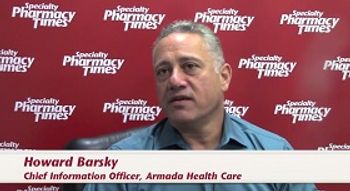
Joe Moose, PharmD, details the hurdles he has come across in today's pharmacy landscape.

Joe Moose, PharmD, details the hurdles he has come across in today's pharmacy landscape.

COL William Pickard, RPh, MS, discusses how his area of practice has changed since he received a 2013 Next-Generation Pharmacistâ„¢ award.

As the 2012 Next-Generation Pharmacist, Joe Moose, PharmD, offers advice to the 2014 Next-Generation Pharmacistâ„¢ award winners and finalists.

COL William Pickard, RPh, MS, describes the impact that the 2013 Lifetime Achievement award has had on his career.

Joe Moose, PharmD, offers his thoughts on the 2014 Next-Generation Pharmacistâ„¢ award finalists.

Chirag Patel, PharmD, a Walgreens pharmacist in Union, New Jersey, discusses how pharmacists can extend the celebration of American Pharmacists Month beyond October.

Joe Moose, PharmD, describes how the Next-Generation Pharmacistâ„¢ award nominations have changed over the years.

Thomas Cohn, chief strategy officer at Armada Health Care, discusses how Armada is changing to meet the needs of the tumultuous Affordable Care Act era.

Michael Nameth, RPh, MBA, chief executive officer of Aureus Health Services discusses the future path of the company.

Chirag Patel, PharmD, a Walgreens pharmacist in Union, New Jersey, notes the hot topics Walgreens pharmacists have addressed throughout American Pharmacists Month.

Stephen Eckel, PharmD, MHA, BCPS, FASHP, divulges what he's learned from his fellow Next-Generation Pharmacistâ„¢ Award finalists.

Chirag Patel, PharmD, a Walgreens pharmacist in Union, New Jersey, details the methods Walgreens pharmacists use to raise awareness for the services they offer.

B. Douglas Hoey, RPh, MBA, CEO of the National Community Pharmacists Association (NCPA), discusses increasing generic drug prices and the problems they create for independent community pharmacists.

Chirag Patel, PharmD, a Walgreens pharmacist in Union, New Jersey, explains how he encourages patients to take a more proactive role in their health care.

Stephen Eckel, PharmD, MHA, BCPS, FASHP, reflects on his fellow 2014 Next-Generation Pharmacistâ„¢ Award finalists.

Chirag Patel, PharmD, a Walgreens pharmacist in Union, New Jersey, details Walgreens' WellTransitions program.

Thomas Cohn, chief strategy officer at Armada Health Care, discusses the biggest challenges specialty pharmacies will face over the next 5 years.

Stephen Eckel, PharmD, MHA, BCPS, FASHP, discusses the hurdles seen in modern pharmacy practice and how pharmacists have overcome those challenges.

Although Fred Eckel, RPh, MS, says pharmacy is a rewarding profession, he advises the 2014 Next-Generation Pharmacistâ„¢ Award winners to "not get frustrated when things don't get done as quickly as you would like to see them get done."

Chirag Patel, PharmD, a Walgreens pharmacist in Union, New Jersey, describes the methods he uses to earn patients' trust.

Asked about any common threads among the 2014 Next-Generation Pharmacistâ„¢ Award Winners, Fred Eckel, RPh, MS, jokingly responds, "They're all younger¦than I."

Stephen Eckel, PharmD, MHA, BCPS, FASHP, discusses how provider status would influence pharmacists' daily practice.

Commenting on the 2014 Next-Generation Pharmacistâ„¢ Awards, Fred Eckel, RPh, MS, notes that the winners "seem to be stronger, more qualified, more diverse in their activities."

Bill Barre, RPh, vice president of business development at MedImpact Healthcare Systems, discusses MedImpact's Centers of Excellence program.

Chirag Patel, PharmD, a Walgreens pharmacist in Union, New Jersey, describes the wellness initiatives that Walgreens pharmacists are introducing to patients.

Fred Eckel, RPh, MS, discusses how pharmacists are becoming more involved in direct patient care.

Stephen Eckel, PharmD, MHA, BCPS, FASHP, describes the challenges pharmacists may face as the health care industry continues to evolve.

With their movement towards provider status, pharmacists are facing the new challenge of entering a marketplace where there are already other providers.

Howard Barsky, chief information officer for Armada Health Care, discusses how specialty pharmacies can improve services for patients through the use of data analytics.

Michael Nameth, RPh, MBA, chief executive officer of Aureus Health Services, discusses the major hurdles facing mid-size specialty pharmacies.